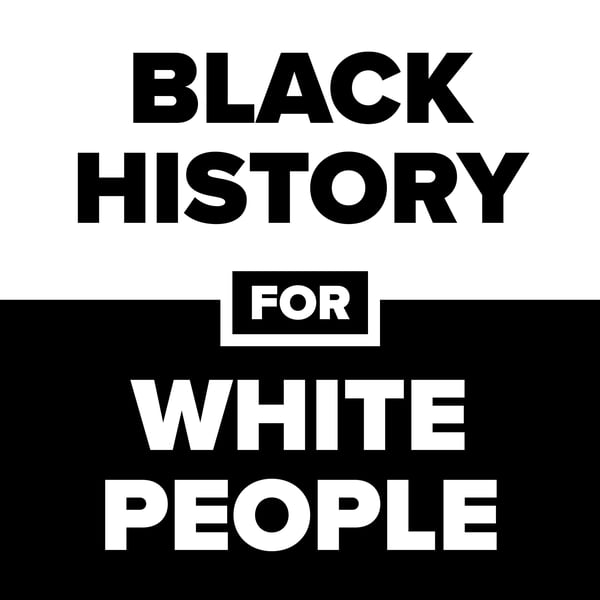Medgar Evers - Part 2
Black History for White People
Black History for White People
3.6 • 719 Ratings
🗓️ 15 February 2023
⏱️ 56 minutes
🧾️ Download transcript
Summary
This is a continuation of last week’s episode on Medgar Evers and part two dives into his work with the NAACP. In 1954, Medgar became the field secretary for the state of Mississippi for the NAACP and was incredibly active and energetic, still having the same energy he had in college. He was involved with the Biloxi wade-in, labor organizing, and getting unions involved in the civil rights struggle. His biographer, Michael Vincent Williams, said his reach encompassed every facet of the civil rights struggle and his presence was felt in voter registration drives, economic boycotts, sit-ins, investigative reporting, and other direct action tactics. He also helped to organize a boycott of the bus system to challenge segregation laws. The boycott was a success, and in 1965 the US Supreme Court declared segregation on buses was unconstitutional. He also sought to register black people to vote, lamenting how the law was used to prevent this. In Jones County, Mississippi, the number of registered black voters went from 1300 to 65. These measures were used by white people to hurt Black people, but also poor people in general. He recognized the systemic oppression of African Americans across the country and the continued threat of violence they faced. It is further noted that Evers played an important role in the Emmett Till investigation, convincing Mamie to have an open casket funeral, which was a pivotal moment that changed the trajectory of history. The conversation serves to illustrate the bravery and commitment of Evers to the cause of civil rights, despite the fear and danger that he faced.
Visit us at blackhistoryforwhitepeople.com.
$5/month supports us at patreon.com/blackhistoryforwhitepeople.
Check us out on Twitter @BHforWP and Instagram @BlackHistoryForWhitePeople or feel free to email us at [email protected].
Support this podcast at — https://redcircle.com/black-history-for-white-people/donations
Advertising Inquiries: https://redcircle.com/brands
Privacy & Opt-Out: https://redcircle.com/privacy
Transcript
Click on a timestamp to play from that location
| 0:00.0 | I don't know what most white people in this country feel, |
| 0:05.0 | but I can only include what they feel from the state of their institutions. |
| 0:10.0 | Now, this is the evidence. |
| 0:13.0 | You want me to make an act of faith, risking myself, my wife, my woman, my sister, my children, |
| 0:20.0 | on some idealism which you assure me |
| 0:23.0 | exists in America, which I have never seen. |
| 0:26.5 | Okay, we are continuing our episode on Medgar Evers, and this is part two. |
| 0:33.3 | So if you're listening to this right now and you're like, part two, what? |
| 0:36.5 | Where was part one? Part one was last week. So make sure you go listen to that before you commit to listening to this right now and you're like, part two, what? Where was part one? Part one was |
| 0:38.1 | last week. So make sure you go listen to that before you commit to listening to this entire |
| 0:42.1 | episode. And we left off with a teaser about something with Medgar and the NWACP. So I'm |
| 0:48.7 | excited about that, but Garron, can you do a maybe a real quick recap? And then let's dive back into Medgar's story. |
| 0:56.3 | Medgar was prolific in the civil rights movement in Mississippi. |
| 1:00.7 | So he was involved in a lot of different aspects of it. |
| 1:04.0 | And a lot of those came through his work with the NAACP and that's what we're going to get into today. |
| 1:09.4 | So in 1954 1954 he became the |
| 1:12.4 | field secretary for the state of Mississippi for the NAACP and he was |
| 1:18.0 | incredibly active, energetic. We talked last week about how in college he was |
| 1:24.6 | doing 30 different things and was very active. |
| 1:27.9 | Well, that same energy continued with him through the rest of his life. |
| 1:31.1 | And it's pretty incredible how much he was able to pack into 24 hours each day. |
| 1:36.9 | So he was, we don't even have time to cover it all, but we previously, we did an episode |
... |
Please login to see the full transcript.
Disclaimer: The podcast and artwork embedded on this page are from Black History for White People, and are the property of its owner and not affiliated with or endorsed by Tapesearch.
Generated transcripts are the property of Black History for White People and are distributed freely under the Fair Use doctrine. Transcripts generated by Tapesearch are not guaranteed to be accurate.
Copyright © Tapesearch 2025.

